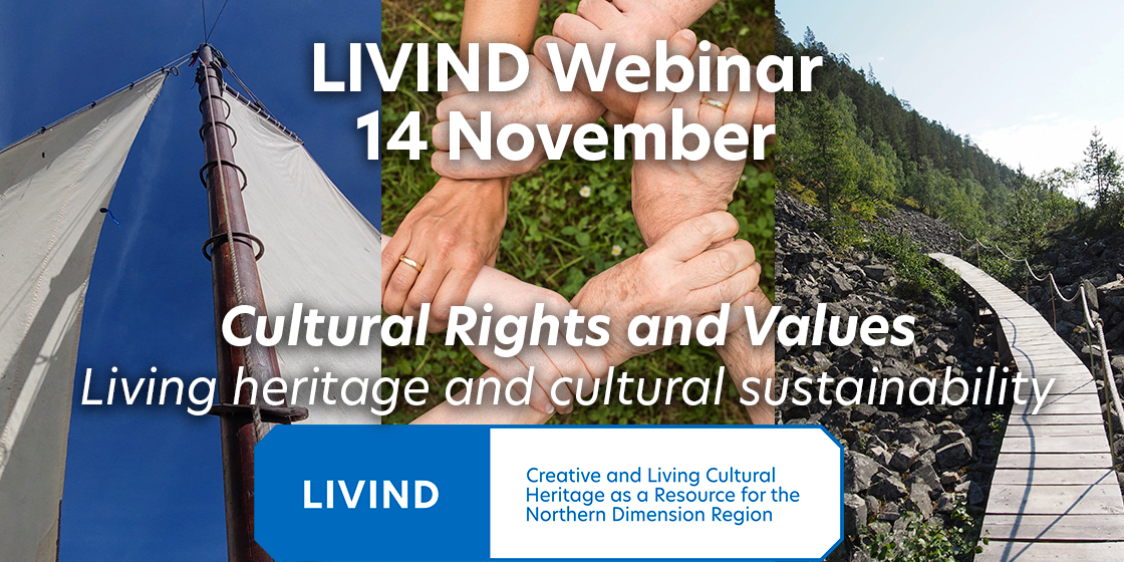
LIVIND webinar on Living heritage and cultural sustainability – cultural rights and values
The cultural pillar, including living heritage, is elemental for achieving sustainable development. This underlines the importance of cultural rights and values, upon which living heritage also builds. On 14 November, in the last webinar of our series of LIVIND webinars on living heritage and sustainable development, we focus on cultural rights and values – sign up now and join to listen and discuss the role of culture and living heritage for achieving sustainable development!
Webinar
Living heritage builds on the continuity of cultural values that are entailed in the living practices. While some values are indeed supportive to sustainability, others can be seen as contradictory to it. What would this mean for the safeguarding of living heritage?
The cultural pillar, including living heritage, is important in achieving sustainable development. Social and institutional structures, such as associations or public cultural centres, are vital for the continuity of living heritage. What are their roles for cultural sustainability? And what measures should be taken to support the sustainability of cultural frameworks, especially in critical times?
In the last one in our series of LIVIND webinars on living heritage and sustainable development we present a keynote on the rights-based approach and showcase examples of established cultural heritage work in Denmark and of sustaining living heritage in today’s Ukraine. We will also learn about how local action by cities and local governments can contribute to strengthening the role of culture for sustainable development.
Join the LIVIND webinar on Living heritage and cultural sustainability – cultural rights and values on 14 November 2022 at 13.30–16.00 EET (12.30–15.00 CET) to hear this intriguing variety of viewpoints on why cultural aspect is so crucial for achieving the sustainability change!
Programme 14 November 2022
(Note: All times in EET!)
13:30 Opening & welcome, Leena Marsio & Elisa Kraatari, Finnish Heritage Agency
13:40 Rights-based approach to living heritage and sustainability – what would that mean? Anita Vaivade, Latvian Academy of Culture (LV)
14:00 Case examples of ICH and cultural sustainability
- The German minority in Denmark as an example of living cultural heritage, Harro Hallmann, Secretariat of the German minority in Copenhagen (DK)
- Living heritage in crisis: experience and considerations from Ukraine, Oleksandr Butsenko, Development Centre “Democracy through Culture” (UA)
- The importance of the cultural pillar for sustainability and local action, Jordi Pascual, United Cities and Local Governments, Culture Committee (ES)
14:45 Commentary note / Questions and comments
14:55 Break
15:00 Discussions in small groups: cultural sustainability and ICH
15:40 Summary of discussions
16:00 Closure
The webinar is free and open to everyone, whether you are a heritage practitioner, an NGO worker, a museum professional, an entrepreneur, an educator, an artist, an activist, or a researcher. We will bring together an exciting group of people working with different domains of living heritage including crafts, performing arts, environmental know-how, oral heritage, festivities, and food.
Please sign up by 15th September.
We will send a joining link to registered participants.
The webinar is part of the project LIVIND – Creative and living cultural heritage as a resource for the Northern Dimension region, coordinated by the Finnish Heritage Agency and covering nine countries from Northern Europe. The webinar and the workshop are organised by the Finnish Heritage Agency in cooperation with the LIVIND project partners. The language of the event is English.
The event is part of the European Heritage Days whose theme in 2022 is Sustainable Heritage.
ABOUT THE LIVIND PROJECT
LIVIND – Creative and living cultural heritage as a resource for the Northern Dimension region started in September 2021. The project is coordinated by the Finnish Heritage Agency and it brings together partners from nine Northern European countries, as well as the Nordic autonomous regions and the Sápmi area.
LIVIND Opening Webinar was organised in November 2021 with participants from 15 countries. This has been followed by more webinars on living heritage and socially sustainable development focusing on the different aspects of sustainability: ecological, social, and cultural sustainability, see webinar programmes here.
The LIVIND project builds on the intangible cultural heritage safeguarding work, but it is closely linked to the UN Agenda 2030 for Sustainable Development. The project makes use of diverse web-based tools that support fluent exchange and increased co-development work between the diverse actors including public bodies and NGOs from the different countries and areas. The project also involves research activities resulting as analyses and policy briefs that support the further development on living heritage. These materials, along with the good practices and experiences from the pilots implemented during the project will be later available on an online platform.
More information
Please, see the LIVIND webpage.
Elisa Kraatari, Project Coordinator, elisa.kraatari(a)museovirasto.fi
Leena Marsio, Senior Advisor, leena.marsio(a)museovirasto.fi